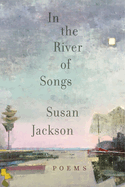
In the stirring poetry collection In the River of Songs, Susan Jackson (Through a Gate of Trees) gilds everyday experiences and unbearable losses with spiritual significance.
"So what lasts?" Jackson asks. "All the people of my family are gone/ and mourned and I am alone save for you." Yet the book's opening poem, "The Woman Who Loved Trees," posits that grief can be transformed and that there might be beauty in change: after beloved cottonwoods are cut down, the space they leave becomes "a singing bowl" and "solitude became her companion/ in her changed landscape." This search for what is hidden and sacred is a pattern in the book. As a piece about her late mother's dementia concludes, "here I thought this poem/ was about what's lost/ but instead turns out to be for every unexpected gift we're/ given."
Jackson's subject matter includes the momentous: her father's death when she was young, the time she witnessed a woman drop dead at an art fair, and a soap bubble that serves as a metaphor for life's transience. At other times the poems touch on the ordinary: making beds, cutting peonies in the garden, watching fledgling wrens or peeling a clementine. Joy is found in simple things, like a perfect boiled egg or a massage. The poetry includes gorgeous nature imagery and alliteration, which will appeal to fans of Mary Oliver. Its up-to-date conscience alludes to Covid-19 and the murder of George Floyd. But the outlook, one that finds "a wedge of eternity" in daily life, feels timeless. --Rebecca Foster, freelance reviewer, proofreader and blogger at Bookish Beck

